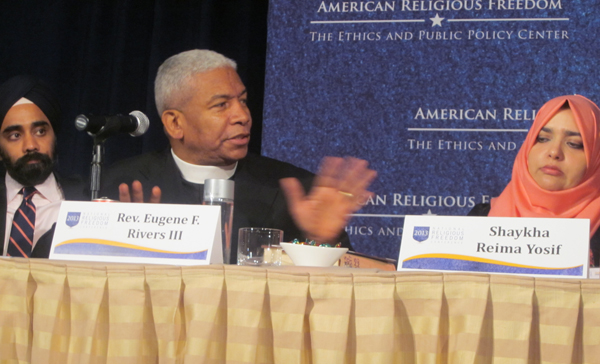WASHINGTON (RNS) In a conference full of people who champion traditional religious values, Amardeep Singh knew that everyone might not appreciate his recounting of the “uncomfortable” cab ride he had taken the previous day.
Singh, a featured speaker at the second annual National Religious Freedom Conference in Washington on Thursday (May 30), told the several hundred attendees that his D.C. taxi driver had the radio tuned to a religiously minded commentator, who was explaining that women become lesbians because they had been abused.
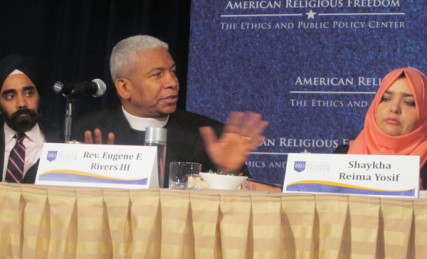
At the National Religious Freedom Conference in Washington Thursday (May 30), advocates included, from left, Amardeep Singh, director of programs for the Sikh Coalition; the Rev. Eugene Rivers, pastor of Boston’s Azusa Christian Community and senior policy advisor to the presiding bishop to the Church of God in Christ, and Shaykha Reima Yosif, founding president of Al-Rawiya, an organization that advocates for Muslims women. RNS photo by Lauren Markoe
His cab story — both his telling and the reaction to it — reveals fault lines in the coalition of Americans concerned that government and popular culture are eroding religious freedom, and trying to banish religion from the public sphere.
“I felt uncomfortable knowing how our community, the Sikh community, is oftentimes broadly stereotyped and those broad stereotypes are used in a way to literally engage in violence,” continued Singh, director of programs at the Sikh Coalition. Sikhs, lesbians — no group should be broad-brushed, he said.
Short of his destination, Singh asked the cabbie to pull over, paid the fare, and explained that he didn’t want to hear such prejudice. You have a right to listen, he said he told the driver, “but I’m also going to exercise my right not to give you business.”
Sitting next to Singh at the podium, the Rev. Eugene Rivers III of the Church of God in Christ, listened intently, narrowing his eyes as Singh spoke.
When Singh had finished, Rivers made clear that he holds differing beliefs, and draws the line of tolerance in a different place. “What the guy said on the radio … there’s actually evidence for the argument that in certain cases young women, in this case we’re talking about lesbians, have come to that orientation as a function of abuse.”
“The radio guy may have simply overstated the case,” continued Rivers, pastor of Boston’s Azusa Christian Community and senior policy adviser to the Church of God in Christ’s presiding bishop.
The panelists who came to assess the state of religious freedom in the nation accepted the point that their various faiths might not stand together on anything beyond the need to protect religious freedom, and that at times, coalition building would present grand challenges that needed to be met head on.
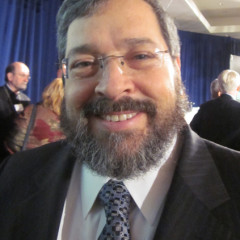
Rabbi Abba Cohen, vice president for federal affairs of Agudath Israel, an Orthodox Jewish policy and leadership organization. RNS photo by Lauren Markoe
Rabbi Abba Cohen, a panelist and vice president for federal affairs of Agudath Israel, an umbrella organization of Orthodox Jews, offered several examples of Jews viewing religious freedom issues differently than non-Jews.
Orthodox Jews do not believe in abortion on demand, but believe that in some particular cases, Jewish law requires abortion, Cohen said. And while he would not argue against a First Amendment right to proselytize, he said proselytization can damage the Jewish community.
Still, taking the larger perspective, Cohen agreed with the conference’s theme that religious liberty is under threat in the U.S. and that religious people must stand together.
On another conference panel, state legislators and activists spoke of the need to for conservatives to court liberal allies to help defend religious rights, and cited examples when the American Civil Liberties Union and Democrats had worked successfully with conservative religious people.
Among the evidence of a deterioration of religious rights offered during the daylong meeting sponsored by the Ethics and Public Policy Center: the Obama administration’s rule requiring employers to provide insurance coverage for contraception; several state universities’ refusal to accept student groups that require their leaders to accept certain tenets of a faith; and companies that are allowed to relegate Muslim women with headscarves to jobs where the public will not see them.
“We see that religion is often treated with derision and ridicule,” Cohen said. “In these rough waters, it’s all hands on deck.”
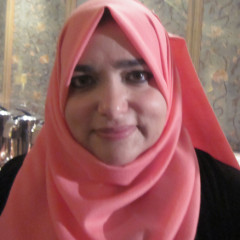
Shaykha Reima Yosif, founding president of Al-Rawiya, an organization that advocates for Muslims women. RNS photo by Lauren Markoe
Muslim theologian Shaykha Reima Yosif, who wears a headscarf and founded an organization to support Muslim women through art and education, said as an easily identifiable follower of Islam, she has often been told to “go back where you came from.”
The U.S.-born Yosif, however, said she has hope that faith leaders can set an example for the rest of the nation on tolerance of traditions other than their own.
“It’s not a priest or a rabbi or a pastor that will say such things. It’s the layman,” she said, referring to the insults that have been thrown at her. “These ideals that we have gathered here today for, we have to make sure that it trickles down to the average everyday American.”
As Singh’s anecdote showed, same-sex marriage and gay rights may be the most likely cause of friction as religious leaders try to assemble themselves into a force to protect religious liberties.
Rivers said his tolerance ends where people force him to accept anything beyond what he knows as biblical truth, or when opponents threaten his tax-exempt status because of his beliefs. He said he would be willing to go to jail to defend his religious views.
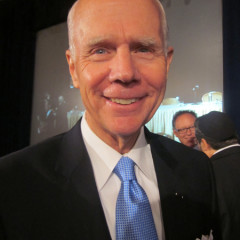
Elder Lance B. Whitman, general counsel of the Church of Jesus Christ of Latter-day Saints. RNS photo by Lauren Markoe
“If you mess with the Bible, I’m going to jail,” he told the crowd, to an enthusiastic round of applause.
Elder Lance B. Wickman, general counsel of the Church of Jesus Christ of Latter-day Saints, took a softer tack. He called homosexuality “a secular thing,” and recognized protections for secular interests. But secular-minded Americans must understand that religion is also central to many people’s identity.
Too often, he said, religion is now considered a “hobby,” in America, a “lifestyle choice” to be confined to the home, church, synagogue or mosque.
“A new closet is being constructed,” he said, “for those with traditional religious values on sexuality and family.”
KRE/AMB END MARKOE
